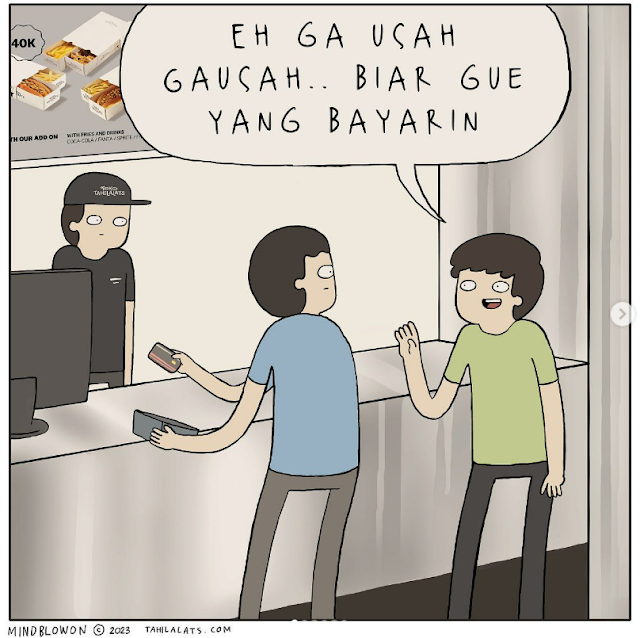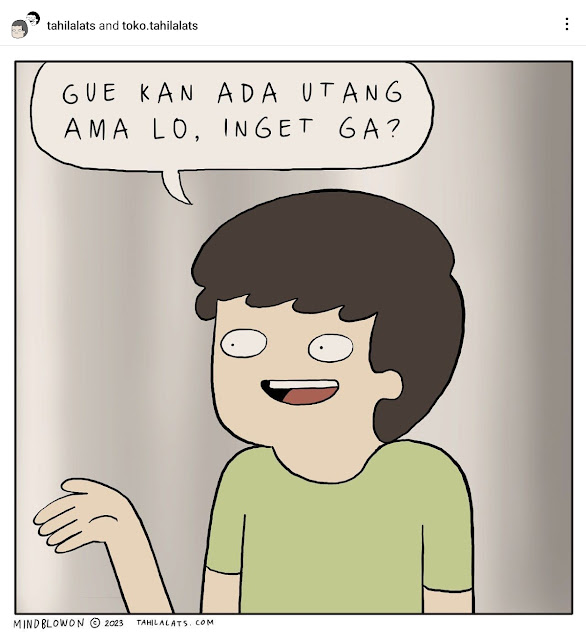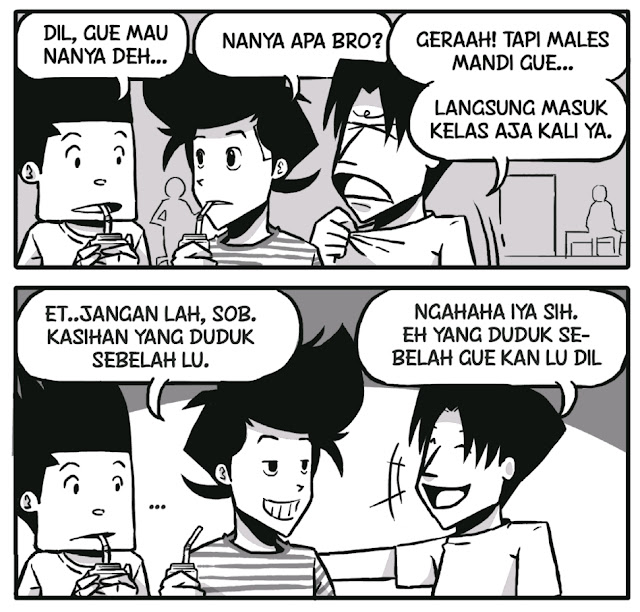- Get link
- X
- Other Apps
Posted by
Iman Prabawa
on
- Get link
- X
- Other Apps
Halo semuanya, ketemu lagi sama saya, Iman Prabawa. In this article, I want to talk about the meaning of the word [kan] in Indonesian. As always, we are going to be watching examples from movies where the word is spoken by Indonesians. Not only from movies, we will also see examples from others, like comics for example, and whatnot.
If you have any questions regarding the Indonesian language, you can ask me directly. You can see how to do that on my About Me page.
If you are a beginner in the Indonesian language, you can learn step by step with My Lesson Here.
So, without further ado, let's get started.
And then A says,
Below is the conversation from the picture above with English translations.
Below is the conversation from the picture above with English translations.
Meaning of Kan In Indonesian
[Kan] that I want to discuss here is the word that stands alone and does not function as a suffix. [Kan] can have many meanings depending on the context.
Here are the meanings and usage of [kan] in Bahasa Indonesia:
1. When you are sure about something, and you use the word [kan] to confirm it. For example, You have an interview in room 402, and then you go looking for a room, and based on the information that is given to you, you are sure that the room is right in front of you. But, to make sure, you ask the person who is in the room.
You: Permisi. Ini ruang 402, kan? (Excuse me. This is room 402, right?)
Someone In the Room: Iya, benar. (Yes, you are right.)
2. To describe the subject or add more detail to the subject. In this case, it functions like a linking verb in the English language. For example, You are looking for something in your garage, and then all of a sudden, you see something that is familiar to you, and you have been looking for it for a long time. You say this.
You: Ih! Itu kan buku gue yang gue cari-cari selama ini. Kok bisa ada di sini? (Oh my God! That is the book that I've been looking for all this time. How in the world this thing is here?)
In this situation, [kan] has the same meaning as [adalah]. Therefore, you can change [kan] with [adalah] into [Itu adalah buku gue yang gue cari-cari selama ini].
In this context, [adalah] means equals to (something). The main idea for the sentence is [Itu kan buku gue], and [yang gue cari-cari selama ini] explains the book. [Itu kan buku gue] has the same meaning as [Itu = buku gue (That is my book)].
3. It is used when you have warned a person to not do something, but that person does not obey your words and does it instead. Or when you have told a person about something, and somehow what you just said suddenly happens in front of you. For example, a Mother tells her son not to open the door because if her son opens it, the snake can get inside. But the son opens the door, and the snake gets into the house. The son then tells his mother, and the mother says this.
Ibu: Kan! Ibu bilang juga apa? Sekarang ulernya masuk tuh gara-gara pintunya kamu buka! Kamu ngga dengerin kata-kata ibu sih! (See? What have I told you not to do? Now, the snake gets into the house because you open the door. You didn't listen to me!)
4. To emphasize something. For example, You ask your brother to clean the room, and then your brother refuses and gives the reason why he doesn't want to do it.
A: Eh, loe bisa tolong bersihin kamar ini ngga? (Hey, could you please clean the room?)
B: Tapi kan kamarnya masih bersih. Baru kemarin gue sapuin. (But the room is still clean. I just swept it yesterday.)
A: Itu di situ, tadi gue numpahin kopi soalnya. (Right there, I just spilled some coffee.)
B: Ah! Loe tuh ye! Kalau gitu mah, loe aja yang bersihin sendiri. (Oh, come on, man! Now, because you did that, why don't you clean it yourself?)
A: Tapi kan gue harus pergi sekarang. (But I have to go now.)
[Kan] in [tapi kan kamarnya masih bersih] is used just to emphasize [tapi=but] and then he gives the reason. Actually, you can omit [kan] and say it [tapi kamarnya masih bersih], but the emotions that you don't want to clean the room also disappear.
The second [kan] in [tapi gue kan harus pergi sekarang] also emphasizes [but] and gives an explanation after the word [tapi]. You can also omit [kan] and say it just [tapi gue harus pergi sekarang], but as I mentioned earlier, the emotions disappear.
Next, we will listen to how to pronounce the word.
How to Pronounce Kan
Here is how you pronounce [kan] in Indonesian
Next, we will watch examples where Indonesians use the word [kan] to better understand how to use it.
Example of Kan In Use
The first example we are about to watch is from a movie called YOLO! Episode 1 (2023). Let's watch the clip below.
Below is the conversation from the scene with English translations.
Roman: Dita, kan? Gue minta nomor lu, dong? (You're Dita, right? Can I have your phone number?)
Dita: Huh!? Ngga mau! (Huh!? Nope, I won't give you!)
Ummu: Ga papa. Gue ada kok. (It's okay. I got her number.)
Dita: Mu! Mu! Misi, misi, misi. (Mu! Mu! Excuse me, excuse me, excuse me.)
Ummu: Ambil aja. Nih! Ambil, ambil. Aduh! (Just take it. Here! Take it, take it. Ouch!)
In this scene, when Roman says, "Dita, kan?" he already knows that her name is Dita, and then he asks for her number. So, [kan] here refers to the first usage and meanings that I've talked about earlier.
Vocabulary From the Scene
[Gue] is informal for [saya] = I. For more about this, you can read my article here, Gue In Indonesian.
[Lu] is informal for [Anda] = you. For more about this, you can read my article here, Lu In Indonesian.
[Dong] falls into the category of phatic expression. It has no meaning, but it delivers emotions. [Dong] here is used to emphasize that Roman really wants to know Dita's phone number.
[Ngga mau] is used when you don't want to give something, don't want to do something, or refuse something that is offered to you.
[Misi] is short for [permisi] = excuse me.
[Aja] is short for [saja] = just. For more about this, you can read my article here, Aja In Indonesian.
The second example is from a comic made by Tahilalats. You can follow them on Instagram, @tahilalats, to read their comics. Let's look at the picture below.
A: Eh, ga usah, ga usah. Biar gue yang bayarin. (Hey, don't! Let me pay the bill!)
Gue kan ada utang ama lo, inget ga? (I owe you money, remember?)
A says this because A and B are having lunch at a restaurant, and B is going to pay for A and then A refuses to be paid by B, and instead, B offers to pay the bill.
[Kan] in here functions to add more details about [gue], that is, [gue] = [ada utang ama lo].
Vocabulary From the Picture
[Utang] = debt.
[Ama] is short for [sama] = with.
[Inget] is informal for [ingat] = remember.
[Ga] = [ngga] = [engga] = [tidak] = no.
The third example is still from Tahilalat's comics and still from the same comic. The following picture is a continuation of the previous picture. Let's look at the picture below.
Here is the conversation from the picture with English translations.
B: Tapi kan utang lo lebih banyak dari ini. (But you owe me money more than this bill)
A: Elah. Santai. (Hey, relax!)
[Kan] in here functions to emphasize [tapi], and then he gives an explanation about it.
Vocabulary From the Scene
[Lebih banyak dari] = more than.
[Ini] = this.
[Elah] is short for [ya elah] and is an exclamation.
[Santai] = relax.
The fourth example is from a comic, Si Juki Seri Keroyokan #1. Let's take a look at the picture below.
Here is the conversation from the picture above with English translations.
Juki: Haah?! Bikin tim futsal untuk anak-anak se-RW? (What? You wanna make a futsal team in this village?)
Pak RW: Yoi. Seru, kan? (Yeah. Awesome, right?)
Here, [kan] is sure to confirm something. Pak RW feels that this is a great idea, and he confirms it by saying [kan].
Vocabulary From the Picture
[Haah?!] is an exclamation showing a surprise.
[Bikin] = [buat] = to make, create.
[Anak-anak] = boys.
[RW] stands for Rukun Warga. RW is an administrative division under the village in Indonesia.
[Se-RW] also means [satu RW] = in this one RW = in this one neighborhood.
[Yoi] means yes. For more about this, you can read my article here, Yoi in Indonesian.
The fifth example is from Juki, Seri Keroyokan #1. Let's take a look at the picture below.
Below is the conversation from the picture above with English translations.
Ibu: Bring, saya mau jemur kasur. Tolong bawain ke atas genteng, dong? (Bring. I want to dry the mattress. Could you please bring this to the roof?)
Hebring: Siap, bu! (Okay!)
Ibu: Hati-hati ya. (Please be careful.)
Hebring: Sip, bu! Jagain tangganya aja. Eitss. Itu kan... (I will! Could you please watch the stairs for me? Hey, that is...
Ibu: Lama amat si Hebring. Udah setengah jam di atas. Lah... Dia malah maen layangan!! (Hebring's been taking a long time. It's been half an hour. What?! He's even playing kites!!
In this situation, when Hebring reaches the roof, he sees a kite there, and then he says,
Itu kan...
But actually, what he wants to say is this.
Itu kan layangan! (That is a kite!)
So, [kan] in this sentence refers to the usage number 2, which I explained above. That is, acts as a linking verb.
Vocabulary From the Picture
[Jemur] is the act of drying something using sunlight. So, you put that thing outside so that sunlight hits it and then makes the item dry.
[Kasur] = mattress.
[Bawain] is informal for [bawakan] = to bring something.
[Genteng] = roof tile, but in this context, it has the same meaning as [atap] = roof.
[Jagain] is informal for [tolong jaga] = please watch for (something).
[Siap!] is usually used when someone gives you an order, and then you are ready to execute it.
[Amat] is informal for [sekali]. [Lama amat] = [lama sekali] = very long.
[Udah] is short for [sudah] = already.
[Di atas] in [udah setengah jam di atas] refers to the roof. Ibu drops [genteng] here. The full sentence is [udah setengah jam di atas genteng].
[Maen] is informal for [main] = play.
[Layangan] = kites.
The sixth example is from Si Juki, Seri Keroyokan #1. Let's take a look at the picture below.
Teman Bedil 1: Dil, gue mau nanya deh. (Dil, I wanna ask you something.)
Bedil: Nanya apa, bro? (What do you wanna ask, bro?)
Teman Bedil 2: Geraah! Tapi males mandi gue. Langsung masuk kelas aja kali ya? (It's so hot in here! But, I don't wanna take a bath. I guess I just came to class without taking a bath.)
Bedil: Et, jangan lah, sob. Kasihan yang duduk sebelah lu. (Hey, I guess you better not do that, bro. Pity for the person sitting next to you.)
Teman Bedil 2: Ngahaha, iya sih. Eh, yang duduk sebelah gue kan lu, Dil. (Hahaha, you're right. But, the person sitting next to me is you, Dil.)
[Kan] in [Eh, yang duduk sebelah gue kan lu, Dil] functions as a linking verb or to describe the subject. The subject in the sentence is a complete subject. That is, [yang duduk sebelah gue] and [kan] functions like equal sign there. [Yang duduk sebelah gue] = lu.
Vocabulary From the Picture
[Nanya] is informal for [bertanya] = to ask.
[Gerah] has the same meaning as [panas] = hot.
[Males] is informal for [malas], and in this context, means the speaker does not want to do something, and in this case, he doesn't want to do [mandi] or take a bath. For more about this, you can read my article here, Males In Indonesian.
[Et] here is used to attract attention.
[Duduk] = sit.
[Kasihan] = pity.
[Ngahaha] is the act of laughing.
[Sih] falls into the category of phatic expression. It doesn't have meaning. For more about this, you can read my article here, Sih In Indonesian.
The seventh example is from Si Juki, Seri Keroyokan #1. Let's take a look at the picture below.
Bapak: Raisah sayang, please turun yah, kan udah bapak bilang tadi. Biar kamu remaja, statusnya kan pelajar, karena ini di sekolah. Utamakan belajar, ya! (Raisah, honey, please come down. I told you earlier even though you are a teenager; you are a student because we are now in school. Prioritize studying, okay?)
Raisah: Iya, tapi! Biar pelajar, di sekolah atau di rumah tetep remaja, kan? Main boleh, dong! (Yeah, but! Even though I'm a student, at school or home, I'm still a teenager, right? I'm allowed to play, aren't I?)
[Kan] in the sentence [kan udah bapak bilang tadi] refers to the uses number 4 of [kan] that I explained above. It is used to emphasize. And [kan] in the sentence [biar kamu remaja, statusnya kan pelajar] functions like equal sign, and you can change [kan] with [adalah] or you can change [kan] with equal sign, [statusnya = pelajar].
[Kan] in the sentence [di sekolah atau di rumah tetep remaja, kan?] is used to confirm something you are already sure about.
Vocabulary From the Picture
[Sayang] = honey, sweetheart.
[Turun] = come down.
[Bapak] = father.
[Pelajar] = student.
[Utamakan] = prioritize.
[Tetep] is informal for [tetap] = still.
[Main] = play.
[Boleh] = allowed.
The eighth example is taken from a TV Program, Tonight Show Net (2023). Let's watch the clip below.
Below is the conversation from the clip above with English translations.
Indro: Kita bestie. (We are besties.)
Desta: Oh, bestie. (Oh, you are besties.)
Indro: Tau ga kenape? (You know why?)
Vincent: Kenape? (Why?)
Indro: Ga nyambung. (She’s so random.)
(*tertawa)
Eca: Kita bestot. (We are bestot.)
Vincent: Hah? (What?)
Eca: Bestie total. (BEStie TOTal.)
Vincent: Ooh! Bestie total. (Oh! Bestie total.)
Indro: Kan! Kan! Kan? Serem ga lo? (See! See! What did I tell you? Crazy, right?)
Desta: Iya, sih. (You’re right.)
Indro: Kan? (I told you!)
[Kan] in this clip refers to the third point that I explained above. Indro explains to Desta and Vincent that Eca is so random, and after he says that, Eca says a word that makes them confused. She just suddenly made a combined word that they didn't understand.
Indro then says [kan] three times. Here, it means like [See? I told you that she is random, right?].
Vocabulary From the Scene
[Kita] = we.
[Tau ga kenape?] = [tahu ngga kenapa?] = [tahu tidak kenapa?] = you know why?
[Kenape] has the same meaning as [kenapa] = why. People in Jakarta sometimes change [a] into [e] like in this example, [kenapa] becomes [kenape].
[Tertawa] = laughing.
[Ga nyambung] is usually said when your friend all of a sudden talks about different topics or when you ask something, but that person asks with something that is not related at all.
[Serem] = [seram] = scary. In this context, [serem] here does not refer to its literal meaning, which is scary.
Read also: Ya Kan Meaning In Indonesian
This wraps up today's article, and if I find another example, Insha Allah, I will update this article again. If you have any questions about this, just leave them in the comment section below, and I'll be happy to answer them for you.
Thank you very much for reading my article, and I'll see you soon. Bye now.
- Get link
- X
- Other Apps
Hello, I'm Iman Prabawa a.k.a Pak Guru Iman. I love to share about languages. My Instagram, @pakguruiman








Comments
Post a Comment